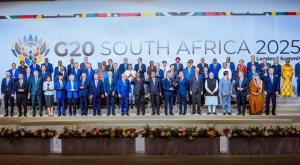Nigeria has urged G20 leaders to support a global framework that guarantees fairness in the extraction and trade of critical minerals, insisting that resource-rich communities in Africa must benefit from the industries built around their land.
President Bola Ahmed Tinubu, represented by Vice President Kashim Shettima at the Third Session of the 2025 G20 Leaders’ Summit in Johannesburg, said critical minerals should drive industrial development in Africa rather than reinforce historical inequities.
This was released in a press statement by Stanley Nkwocha, Senior Special Assistant to the President on Media & Communications (Office of the Vice President), on Saturday.
According to the statement, Shettima said the continent’s natural wealth carries the potential for economic transformation, but warned that “the possession of resources alone does not guarantee prosperity,” stressing the need for transparency and accountability in global mineral supply chains.
He added that Nigeria wants “value addition at the source” so that host communities “are not left behind.”
Speaking on the summit’s theme, “A Fair and Just Future for All: Critical Minerals, Decent Work, Artificial Intelligence,” the Vice President said Nigeria is training young people in technology and vocational skills under the Renewed Hope Agenda to ensure that economic transitions remain people-centred. “Decent work is the anchor that makes these transitions fair, inclusive and sustainable,” he said.

President Tinubu also endorsed the establishment of ethical global standards for artificial intelligence, arguing that AI must reinforce development rather than widen global inequality. “Nigeria supports the creation of global ethical standards for AI that uphold safety, transparency and equity,” he said. “We must ensure that AI becomes a tool of empowerment, not exclusion; of job creation, not displacement.”
He called for structured cooperation between developed and developing countries to manage the risks of AI and expand its benefits. According to him, multilateral dialogue is required to address systemic bias and prevent technological divides.
Turning to global finance, President Tinubu told G20 leaders that the current international financial system no longer reflects contemporary realities. He argued that developing nations face constraints that weaken trade and financial inclusion, warning that debt pressures continue to undermine growth. “Only a more equitable and more responsive system can manage global financial flows with fairness and address recurring debt crises with sincerity,” he said.
He insisted that Africa cannot achieve a shift in its development trajectory “without a collective resolve of the G20,” noting that sustainable financing is critical for implementing national priorities.
President Tinubu urged the summit to place debt sustainability and responsible mineral governance at the centre of its agenda, saying these issues are essential to building a global economy that “uplifts rather than excludes.”
The Nigerian delegation emphasised that Africa seeks a future in which it is not merely a supplier of raw materials but a continent where value creation and innovation thrive.






